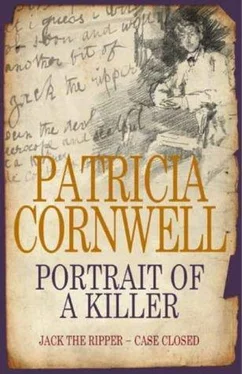Patricia Cornwell - Portrait Of A Killer - Jack The Ripper - Case Closed
Здесь есть возможность читать онлайн «Patricia Cornwell - Portrait Of A Killer - Jack The Ripper - Case Closed» весь текст электронной книги совершенно бесплатно (целиком полную версию без сокращений). В некоторых случаях можно слушать аудио, скачать через торрент в формате fb2 и присутствует краткое содержание. Жанр: Триллер, на английском языке. Описание произведения, (предисловие) а так же отзывы посетителей доступны на портале библиотеки ЛибКат.
- Название:Portrait Of A Killer: Jack The Ripper - Case Closed
- Автор:
- Жанр:
- Год:неизвестен
- ISBN:нет данных
- Рейтинг книги:5 / 5. Голосов: 1
-
Избранное:Добавить в избранное
- Отзывы:
-
Ваша оценка:
- 100
- 1
- 2
- 3
- 4
- 5
Portrait Of A Killer: Jack The Ripper - Case Closed: краткое содержание, описание и аннотация
Предлагаем к чтению аннотацию, описание, краткое содержание или предисловие (зависит от того, что написал сам автор книги «Portrait Of A Killer: Jack The Ripper - Case Closed»). Если вы не нашли необходимую информацию о книге — напишите в комментариях, мы постараемся отыскать её.
Portrait Of A Killer: Jack The Ripper - Case Closed — читать онлайн бесплатно полную книгу (весь текст) целиком
Ниже представлен текст книги, разбитый по страницам. Система сохранения места последней прочитанной страницы, позволяет с удобством читать онлайн бесплатно книгу «Portrait Of A Killer: Jack The Ripper - Case Closed», без необходимости каждый раз заново искать на чём Вы остановились. Поставьте закладку, и сможете в любой момент перейти на страницу, на которой закончили чтение.
Интервал:
Закладка:
On September 21, 1864, when Ellen was fifteen, her father wrote her asking her to please look after her younger sisters. "Much will depend on your influence amp; still more on your example," he wrote. "I wished to have told you how much your Mamma amp; I looked to your good example," and he expected her to help "bring [your sisters] into a perfect state of discipline." This was an unrealistic expectation for a fifteen-year-old struggling with her own losses. Ellen was never allowed to grieve, and the burden and pain must have become almost unbearable when her father died a year later.
The very smog that helped cloak the peregrinations and violent crimes of Ellen's future husband robbed her father of his life. For years Cobden had been susceptible to respiratory infections that sent him on voyages or to the seaside or the countryside - wherever there was better air than the sooty soup of London. His last trip to London before his death was in March 1865. Ellen was sixteen and accompanied him. They stayed in a lodging house on Suffolk Street reasonably close to the House of Commons. Cobden was immediately laid up with asthma as black smoke gushed from chimneys of nearby houses, and the east wind blew the noxious air into his room.
A week later, he lay in bed praying that the winds would mercifully shift, but his asthma worsened and he developed bronchitis. Cobden sensed the end had come and made out his will. His wife and Ellen were by his bed when he died on Sunday morning, April 2, 1865, at the age of sixty-one. Ellen was the "one whose attachment to her father seems to have been a passion scarcely equaled among the daughters," said Cob-den's lifelong friend and political ally John Bright. She was the last one to let go of her father's coffin as it was lowered into the earth. She never let go of his memory or forgot what he expected of her.
Bright would later tell Cobden's official biographer, John Morley, that Cobden's "was a life of perpetual self-sacrifice… I never knew how much I loved him until I had lost him." Monday, the day after Cobden's death, Benjamin Disraeli said to members of Parliament in the House of Commons, "There is this consolation… that these great men are not altogether lost to us." Today, in the Heyshott village church there is a plaque on Cobden's family pew that reads, "In this place Richard Cob-den, who loved his fellow men, was accustomed to worship God." Despite Cobden's best intentions, he left an unstable wife to take care of four spirited daughters, and despite the many promises made by influential friends at the funeral, the "daughters of Cobden," as the press called them, were on their own.
In 1898, Jam'e reminded Ellen how "all those who professed such deep admiration and affection for [our] father during his lifetime forgot the existence of his young daughters, the youngest but 3M years old. Do you remember Gladstone at father's funeral telling mother that she might always rely on his friendship amp; her children also - The next time I met him, or spoke to him… was more than 20 years later. Such is the way of the world!"
Ellen held the family together, as she had promised her father she would. She handled the family finances while her mother moved numbly through the last few years of her unhappy life. Had it not been for Ellen's dogged cajoling and firm supervision of the family affairs, it is questionable whether bills would have been paid, young Annie would have gone to school, or that the daughters could leave their mother's house and move into a flat at 14 York Place, on Baker Street, London. Ellen's yearly stipend was 250 pounds, or at least this was what she told her mother she would need. It can be conjectured that each daughter received the same amount, insuring them a comfortable existence, as well as a vulnerability to men whose intentions may not have been sterling.
Richard Fisher was engaged to daughter Katie when Cobden died, and he rushed her into marriage before the family had stopped writing letters on mourning stationery. Over the years Fisher's greedy demands would prove a constant source of irritation to the Cobdens. In 1880, when Walter Sickert entered the lives of the Cobden daughters, Katie was married, Maggie was too spirited and frivolous to serve an ambitious, manipulative man any useful purpose, and Janie was far too savvy for Sickert to go near. He picked Ellen.
Both her parents were dead. She had no one to advise her or raise objections. I doubt that Sickert would have gained Richard Cobden's approval. Cobden was a wise and insightful man and would not have been 'fooled by Sickert's acts or enchanted by his charm. Cobden would have detested the absence of compassion in the handsome young man.
"Mrs. Sickert and all her sons were such pagans," Janie would write Ellen some twenty years later. "How sad that fate has ever brought you into their midst."
The differences between the character of Ellen's father and that of the man she would marry should have been blatantly obvious, but in Ellen's eyes the two men might have appeared to have much in common. Richard Cobden did not have an Oxford or Cambridge education and was in many ways self-taught. He loved Shakespeare, Byron, Irving, and Cooper. He was fluent in French, and as a young man he had fantasized about being a playwright. His love of the visual arts would be a lifelong affair, even if his attempts at writing for the stage were a failure. Cobden too was not adept at handling finances. He might have been savvy in business, but he had no interest in money unless he had none.
At one point in his life, his friends had to raise sufficient funds to save the family home. His financial failings were not the result of irresponsibility but were a symptom of his driving sense of mission and idealism. Cobden was not a spendthrift. He simply had loftier matters on his mind, and this may have impressed his daughter Ellen as a noble flaw rather than a blameworthy one. Perhaps it was fortuitous that in 1880, the year Sickert first met Ellen, John Morley's long-awaited two-volume biography of Cobden was published.
If Sickert read Morley's work, he could have known enough about Cobden to script a very persuasive role for himself and easily convince Ellen that he and the famous politician shared some of the same traits: a love of the theater and literature, an attachment to all things French, and a higher calling that was not about money. Sickert might even have convinced Ellen that he was an advocate of women's suffrage.
"I shall reluctantly have to support a bitches suffrage bill," Sickert would complain some thirty-five years later. "But you are to understand I shall not by this become a 'feminist.' "
Richard Cobden believed in the equality of the sexes. He treated his daughters with respect and affection - and never as witless brood mares good for nothing but marriage and childbearing. He would have applauded the political activism of his daughters as they matured. The 1880s were a time of foment for females as they formed purity and political leagues that lobbied for contraception, reforms to help the poor, and the right to vote and to have representation in Parliament. Feminists such as the Cobden daughters wanted to enjoy the same human dignity as men, and that meant quashing entertainment and vices that promoted the enslavement of women, such as prostitution and the lasciviousness of London's many music halls.
Sickert must have sensed that Ellen's life belonged to her father. There was nothing she would do to smear his name. When she and Sickert divorced, Janie's prominent publisher husband, Fisher Unwin, contacted the chief editors of London's major newspapers and requested that they print "nothing of a personal nature" in their papers. "Certainly," he insisted, "the family name should not appear." Any secret that might have hurt Richard Cobden was safe with Ellen, and we will never know how many secrets she took to her grave. For Richard Cobden, the great protector of the poor, to have a son-in-law who slaughtered the poor was inconceivable. The question may always be whether Ellen knew that Walter had a dark side "From Hell," to quote a phrase the Ripper used in several of his letters.
Читать дальшеИнтервал:
Закладка:
Похожие книги на «Portrait Of A Killer: Jack The Ripper - Case Closed»
Представляем Вашему вниманию похожие книги на «Portrait Of A Killer: Jack The Ripper - Case Closed» списком для выбора. Мы отобрали схожую по названию и смыслу литературу в надежде предоставить читателям больше вариантов отыскать новые, интересные, ещё непрочитанные произведения.
Обсуждение, отзывы о книге «Portrait Of A Killer: Jack The Ripper - Case Closed» и просто собственные мнения читателей. Оставьте ваши комментарии, напишите, что Вы думаете о произведении, его смысле или главных героях. Укажите что конкретно понравилось, а что нет, и почему Вы так считаете.












